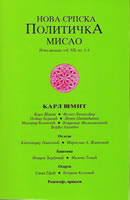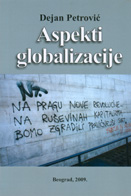| NSPM in English | |||
Playing with fire |
 |
 |
 |
| понедељак, 11. август 2008. | |
|
When the cold war ended, many people understandably expected a radical rethinking of America 's global security commitments. Without the Soviet Union and Warsaw Pact, there seemed little need for NATO, at least an American led and dominated NATO. Without a Soviet Union and Maoist China to back North Korea , there seemed little reason for America 's promise to defend South Korea . With no red navy, from either the USSR or China , circling the Pacific, there seemed little cause for American forces on station to defend Japan . However, instead of dismantling or even shrinking its cold-war alliance structure, the United States has expanded its defense commitments. Former Warsaw Pact and even Soviet republics have now been inducted into the “ North Atlantic ” Treaty Organization. The bilateral security guarantees to Japan and the Republic of Korea remain in place. Early in his term President George W. Bush made explicit—until reined in by his aides— America 's promise to defend Taiwan . Iraq has joined Israel as a Middle Eastern country on the Pentagon's “to defend” list. The number of such nations is more likely to increase than contract under either President John McCain or President Barack Obama. The common argument for expanding America 's alliances all over the world, irrespective of America 's actual security interests, is stability through deterrence. If Poland , Estonia , Georgia and other Eastern European states become members of NATO, the theory runs, Russia won't dare attack them. ( Washington might claim that expanding the alliance has nothing to do with Moscow , but the Russians are not stupid. Nor are the countries seeking membership in what originated as the quintessential anti-Soviet alliance.) The same claim is used for making formal such informal commitments as U.S. support for Taiwan . Tell China that the United States would intervene in any conflict and Beijing would have no choice but to back off. Oddly, proponents of this strategy do not take it to its logical conclusion. If the argument is right, then America should ally with every nation. Offer a security guarantee to any country threatened or potentially threatened by another, thereby ensuring that the world's superpower will come to its defense. The result will be an era of world peace. The lion will lie down with the lamb. People will circle the globe holding hands and singing kumbaya. Unfortunately, alliances can promote war as well as peace. Perhaps the best example is the pre–World War I lineup of the Entente versus the Central Powers. Competing alliances created for the purpose of ensuring security turned into transmission belts of war, transforming the assassination of Austria-Hungary's heir apparent into a global conflagration that killed upwards of 20 million people. First, the military connections ensured that the dominant empires would go to war when the minor partners quarreled. Germany and Russia (and France and Great Britain , less directly) lost the flexibility to say no to war. Second, by offering military backing the German and Russian empires encouraged their allies to take irresponsible gambles, presuming that their bigger partners would bail them out of any resulting difficulties. The Russian Empire backed the terrorist state of Serbia to maintain the former's Balkans influence; the German Empire offered Austria-Hungary the famous “blank check” for use in confronting Russia . As a result, both empires unintentionally encouraged allied irresponsibility, world war, and their own destruction. The expansion of NATO up to Russia's borders risks having a similar impact. The original NATO had a clear purpose: to protect Western Europe from Soviet aggression, which could result in a hostile power controlling much of the Eurasian land mass. With the collapse of the Soviet Union and dissolution of the Warsaw Pact, that threat disappeared. There was no longer any necessity for an American security guarantee for the Western Europeans; there was no conceivable reason to expand American defense commitments up to Russia 's border. Doing so has proved to make the world more rather than less dangerous—at least for the United States . The former Eastern Europeans possess subpar militaries which do nothing to help defend America and which actually cost the United States money to train and equip. Manpower contributions to Afghanistan and Iraq range from a score or two of soldiers from countries like Albania and Estonia, to a few hundred from Poland, to two thousand from Georgia—more symbolic than real. Worse, all these nations bring their bilateral and regional quarrels with them into NATO. And America 's security guarantee only encourages irresponsibility. The previous government of Poland did its best to offend everyone, starting with NATO ally Germany . Estonia created a bitter quarrel with Russia by moving a World War II memorial. Georgia has sparked a war by misplaying a geopolitical game of chicken with Moscow over two insignificant territories, Abkhazia and South Ossetia . The issue is not whether all these governments had the legal right to act as they did. The question is whether it was prudent for them to do so. Living next to the Russian bear might not be pleasant, but it is a reality for numerous countries. Common sense dictates dampening rather than inflaming conflict. The last government of Taiwan exhibited similar irresponsible tendencies. President Chen Shui-bian believed that the United States would defend the island state from any Chinese attempt at forcible reunification, so he pushed hard to promote Taiwan 's separate and independent identity, while cheerfully irritating Beijing whenever possible. He may have had the legal right to do so. Perhaps he had the moral right to do so. But he surely was not prudent in doing so. Washington attempted to rein in Taipei, but had few effective tools for doing so. American officials muttered about not intervening if Taiwan sparked a crisis with China , but begging off Taiwan 's defense in a crisis based on arbitrary juridical niceties would leave Washington 's international reputation in tatters. Beyond that the United States could do little other than punish Chen by limiting his opportunity to visit America while transiting to other nations. Not a bad deal from Taipei 's standpoint. Georgian president Mikheil Saakashvili is following in similar footsteps. Although denied approval of a Membership Action Plan by NATO, Georgia still has an Individual Partnership Action Plan, which provides for cooperation with the alliance, and has been strongly backed by the Bush administration, which helped train and equip Georgia 's military and pushed to bring Georgia into the alliance. Saakashvili's hope for allied aid and support if Georgia was attacked by Russia likely encouraged him to strike South Ossetia, which triggered Moscow 's intervention. Ironically, the prospect of Georgian membership in NATO essentially forced Russian Prime Minister Vladimir Putin to respond to Tbilisi 's attempt at a blitzkrieg conquest of South Ossetia . If Georgia eventually enters NATO, any Russian military action would create a crisis for America and Europe : playing the international game of chicken then would be far more dangerous for all concerned. However, responding violently and overwhelmingly today will demonstrate to America and Europe the risks of inviting Georgia to join the alliance. It is one thing for NATO to accept a country with simmering conflicts with its big neighbor; it is something else entirely to include a nation at war with its big neighbor. Indeed, imagine Georgia as a member of NATO. Then the United States would be a permanent hostage to Mikheil Saakashvili's domestic political machinations and foreign-policy ambitions. His attack on South Ossetia was extraordinarily foolish, a convenient invitation to a hostile government desirous of teaching him a lesson if not overthrowing him to retaliate dramatically and devastatingly. Russia is unlikely to emerge well from the present conflict. Even military victory will yield diplomatic isolation. The United States needs Russian cooperation elsewhere, but is likely to push more firmly its missile-defense program and perhaps other military measures against Moscow . The fractious Europeans will find renewed fear of Russia to be a source of unity—and perhaps even an impetus for a more serious defense effort. But Georgia will lose under any scenario. Abkhazia and South Ossetia will be permanently detached. Georgia will be wrecked economically and cowed militarily. The country may even be occupied and Saakashvili ousted. Tbilisi 's policy was mad, but, thankfully did not commit the West because Georgia is not a member of NATO. While Georgia as a member of NATO might have deterred Russian action, it would have ensured NATO involvement had Moscow nevertheless intervened. And membership would have encouraged Tbilisi to be even more irresponsible. That would be a dubious enough deal if Georgia was strategically important to America. It would be a disaster given Tblisi's marginal relevance to Western security. Conflict in the Caucasus should be a wake-up call for Washington to stop promiscuously distributing security guarantees as if they were free. They are not. Alliances are not a panacea to stop war. In fact, for America they have increasingly become potential transmission belts of war. As would have NATO membership for Georgia. Doug Bandow is the Robert A. Taft Fellow at the American Conservative Defense Alliance. A former special assistant to President Ronald Reagan, he is the author of Foreign Follies: America's New Global Empire (Xulon Press). (11.08.2008 The National Interest)
|
Од истог аутора
- France Falls Again
- The End of Nonproliferation
- Riyadh Scores One for Tehran
- Fear and Exhilaration in America
- Conservatives for Empire
- Departing Europe
- Bankrupt Empire
- Europe Doesn’t Matter
- Ukraine’s Counterrevolution
- A War We Can’t Afford
- Holier Than Thou
- Guns & Butter
- The China Syndrome
- More Friends, More War
- The Russian Hangover
Остали чланци у рубрици
- Playing With Fire in Ukraine
- Kosovo as a res extra commercium and the alchemy of colonization
- The Balkans XX years after NATO aggression: the case of the Republic of Srpska – past, present and future
- Из архиве - Remarks Before the Foreign Affairs Committee of the European Parliament
- Dysfunction in the Balkans - Can the Post-Yugoslav Settlement Survive?
- Serbia’s latest would-be savior is a modernizer, a strongman - or both
- Why the Ukraine Crisis Is the West’s Fault
- The Ghosts of World War I Circle over Ukraine
- Nato's action plan in Ukraine is right out of Dr Strangelove
- Why Yanukovych Said No to Europe

.jpg)








 As war rages between Georgia and Russia, some NATO advocates argue that peace would reign had the Western alliance offered Georgia a Membership Action Plan last spring. Actually, Georgian and Russian perceptions of potential NATO support for Georgia almost certainly radicalized both sides, making war all but certain. In practice, alliances can be destabilizing as well as stabilizing.
As war rages between Georgia and Russia, some NATO advocates argue that peace would reign had the Western alliance offered Georgia a Membership Action Plan last spring. Actually, Georgian and Russian perceptions of potential NATO support for Georgia almost certainly radicalized both sides, making war all but certain. In practice, alliances can be destabilizing as well as stabilizing. 











